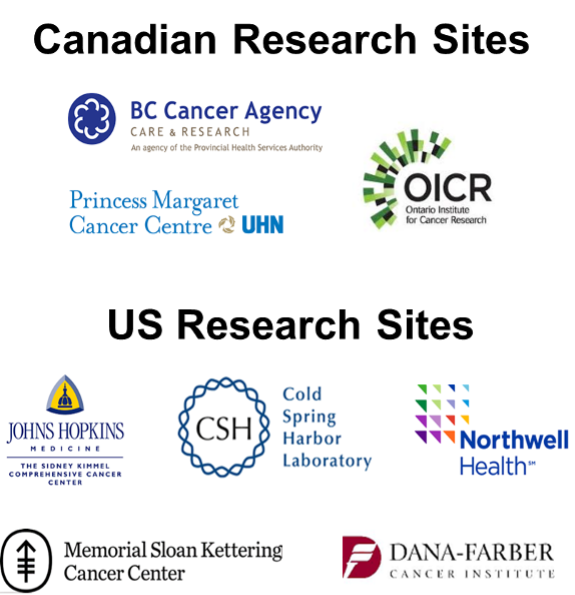PASS-01
The discovery of pancreatic cancer subtypes has been a significant step forward in our mission to understand more about this disease and treat it better. It also means that this disease is more personal to a patient than we could have imagined – right down to the molecular level.
Because of this, researchers believe the future of treating pancreatic cancer is in personalized medicine, which enables doctors to tailor treatment plans specifically to an individual patient based on disease subtypes and other medical considerations.
Enter PASS-01: an exciting collaboration between a group of the foremost cancer centres in North America focused on exploring personalized medicine in pancreatic cancer using cutting-edge organoid technology.
We have brought together some of the finest pancreatic cancer researchers in North America; the time is right to dig in much deeper to help understand pancreatic cancer. We need to stop assuming one size fits all and instead advance the field by gaining a better understanding of every tumour. We believe our work can help doctors treat patients optimally today while providing a better understanding of this deadly disease into the near future.
The next frontier in patient care
Currently, personalized medicine for pancreatic cancer patients includes a comprehensive evaluation of the tumour’s genomic profile. But, doctors still don’t know enough about the different subtypes of pancreatic cancer to determine which of the two leading chemotherapy treatments might actually help an individual patient.
Through the use of genomic analysis and organoid technology, PASS-01 aims to determine potential predictors of patient response to chemotherapy, as well as the identification of specific biomarkers that indicate which pancreatic cancer responds better to one treatment or another.

What is an organoid?
Organoids are an innovative way of providing personalized medicine: created using a patient’s own cancer cells to make a collection of “tumour avatars”, researchers are able to test 100+ treatments on the cancer cells at the same time, enabling them to quickly see which treatment would be most effective for each patient. The efficiency of using organoids is a powerful tool to improve pancreatic cancer outcomes – a disease that moves so swiftly that patients have no time to waste. PASS-01 will couple this expedited approach with access to novel therapies which will not only result in better treatment decisions for patients in real time, but help doctors make more informed treatment decisions faster on a broad scale in the future.
What are the goals of this trial?

Give patients more time with their loved ones and better quality of life through access to novel drugs they might not otherwise receive.

Increase our foundational understanding about the different subtypes of pancreatic cancer and the efficacy of potential biomarkers to help inform treatment plans for future patients.

Support personalized medicine becoming standard of care, giving each pancreatic cancer patient the best possible outcome based on their subtype.
Building on a legacy of promising research
The improvements to patient care PASS-01 aims to achieve are possible because of the ground-breaking COMPASS study, which conducted comprehensive genomic analysis of metastatic and locally advanced pancreatic cancer tumours from hundreds of patients across Canada, generating one of the richest datasets of pancreatic cancer clinical data and genomics information in the world. From this breadth of research, scientists have increased their understanding of the biology of pancreatic cancer tumours, leading researchers to discover the different subtypes of pancreatic cancer and a potential biomarker called GATA6, a promising tool that may go on to inform treatment. We are incredibly proud that our pacesetting investments in COMPASS have led to a collaborative clinical trial that draws on the expertise of some of the leading cancer centres across North America, having the potential to revolutionize how physicians treat pancreatic cancer patients to give them more time with their loved ones.
Updated from Dr. Jennifer Knox, Primary Investigator, on the progress of the PASS-01 Trial, Fall 2022
PASS-01 is benefiting patients right now, while helping us increase our understanding of pancreatic cancer and how different subtypes of the disease respond to various treatments. In addition to the progress we’re seeing in the prognosis and quality of life of patients, other important advancements are being made as a result of this trial:
- PASS-01 researchers have discovered that 5% of pancreatic cancer patients have a specific mutation that appears to indicate a better prognosis. Five percent is not insignificant for a cancer like pancreatic where biomarkers are few and far between.
- Scientists have developed new software through the PASS-01 study that significantly increases the speed and capacity for screening tumour samples.
- Based on insights learned through PASS-01, investigators are considering development of AI tools that will allow for more immediate assessment of a tumour’s sensitivity to a broader range of therapies.
- The level of collaboration between leading cancer centers working across geographic borders, healthcare systems, and institutions has been tremendously successful and is setting a standard for future studies.
An International Effort
PASS-01 represents an important cross-border effort between Canadian and American cancer centres and research institutes working together to change the outcome for pancreatic cancer patients. Each centre plays a different part in the research process, drawing from their specialties, capacity and focus.
PASS-01 By the Numbers
Patients
Participating Research Centres
Countries

Further Resources
PASS-01 is a Stand Up To Cancer Pancreatic Cancer Convergence Dream Team, which is funded by the Pancreatic Cancer Collective, an initiative of the Lustgarten Foundation and Stand Up To Cancer® (SU2C), SU2C Canada and Pancreatic Cancer Canada.

316-4211 Yonge Street
Toronto, ON M2P 2A9
Toll Free: 1-888-726-2269
info@pancreaticcancercanada.ca
Charitable Registration Number 84870 1967 RR0001

